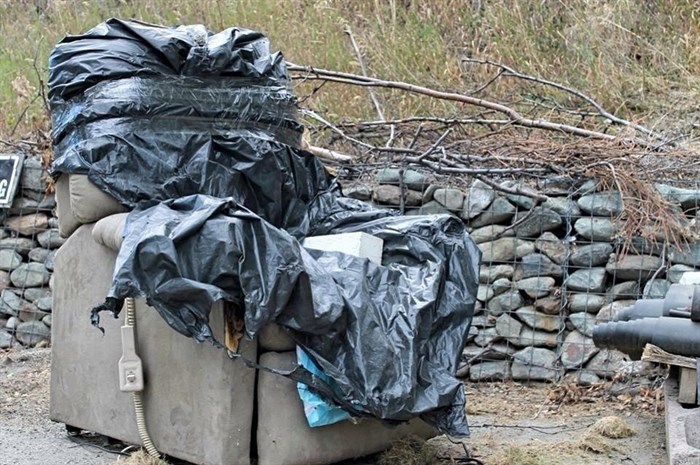
Tillie's chair which caught fire Aug. 24.
(GLYNN BROTHEN / iNFOnews.ca)
August 28, 2015 - 9:00 PM
KAMLOOPS - Interior Health may conduct a review of a Kamloops senior's file to determine if there should be improvements to senior care after the woman died from injuries relating to a fire in her home.
Matilda ‘Tillie’ Olineck, 72, was smoking a cigarette before she caught fire in her chair at the Glenfair senior's complex downtown, Aug. 24. She later died in Royal Inland Hospital from burns covering 65 per cent of her body. Her daughters, Jackie and Jeanne are both requesting better care for seniors still living in their homes.
Prior to her death, Olineck had care aides coming to her home up to four times a day.
Cathy Thibault from Interior Health says the authority is still determining if a review is warranted for Olineck’s file, but says she cannot comment specifically on the case and whether or not improvements are warranted.
“Any reviews that are done we'll be really taking a hard look at them and if there is conditions for improvement that will make things better for patients and their families we will be taking a hard look at it,” Thibault says.
While she says she "wouldn’t doubt" that a review for Olineck’s file would move forward, she says the authority would take the opportunity to listen to Olineck's family members and determine if improvements would be made. If and when staff completes a review, Thibault says it would be an internal document not available to the public.
"(We would be) looking at it internally and trying to look at how are we doing, are we listening well enough. In this case it is not an outcome that anybody could have anticipated and our deepest condolences are given to the family,” she says.
HOW THE CITY FARES FOR SENIOR CARE
Thibault says the demands on home care for senior patients in the city is always fluctuating. Changes are based on population numbers, if there’s an outbreak of a communicable disease, or the amount of care individuals need, she says.
In the last five years, Thibault says the amount of hours contributed to in home services in the city has doubled from 100,000 to 200,000 as of March 2015 numbers.
“We want to support people who wish to remain in their homes,” she says adding 95 per cent of clients want to stay at home as long as possible.
Possibly what’s more troubling is the unknown number of seniors who might need service. To find those who are in need of care and assistance, Thibault says Interior Health relies on physician recommendations but also on concerns from family members.
As for facility care, Thibault says the numbers change as spots open and close in care homes.
Even if spaces do become available, patients might not want to go.
"There are times when we do have capable individuals and they do have the right to make choices on where to live, even if that means accepting certain risks," Thibault says. "There are times where the health authority or the family members don’t agree with their choices. In cases where the decision-making capability is being questioned, there’s another process that often family’s go down to make changes."
Thibault says when patients can no longer make decisions, it results in a round table discussion with the patient, his or her physician and family members.
“Usually everybody agrees in the end what the best course of action will be,” she says but adds if pushback continues, it could become a legal matter for family members. If a client refuses service from care aides in the interim, she says it is the care aide’s duty to report it to the clinician.
Olineck’s daughters say their mother often refused service from her care aides. Both add their mother suffered from dementia which they say added to her risk of living in the home.
To contact a reporter for this story, email Glynn Brothen at gbrothen@infonews.ca, or call 250-319-7494. To contact the editor, email mjones@infonews.ca or call 250-718-2724.
News from © iNFOnews, 2015